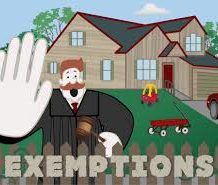Keeping Your Property in Bankruptcy

One of the most common questions people ask before filing for bankruptcy is, “can I keep my property?” The short answer is that it depends on the type of bankruptcy you file (Chapter 7 or 13), along with the type of property and the value of said property at the time of the bankruptcy. We previously wrote about the differences between Chapter 7 and Chapter 13 bankruptcy. (http://www.law-and-beyond.com/2019/09/341-meeting-of-creditors/) In this article, we will discuss what real or personal property can be kept when filing Chapter 7 or Chapter 13 bankruptcy.
Chapter 7
In Chapter 7 bankruptcy, the trustee will sell the property you are unable to exempt and use the proceeds to pay your unsecured debts, such as credit cards and personal loans. Chapter 7 is the bankruptcy option that gets rid of your debt faster. If you have a large amount of equity in your home that is outside the exemption values, you do not want to file a Chapter 7 because the equity would not be protected and a debtor could lose his/her home.
In California, you can keep your home in Chapter 7 bankruptcy under certain circumstances, depending on the amount of equity you have in your principal residence. This is called the “homestead exemption.” The amount of the exemption varies, depending on age, marital status and physical/mental condition. If you are already behind on your mortgage or have significant equity in your home (and want to keep your home), Chapter 7 is not for you. A Chapter 13 may be more appropriate (discussed later in this article).
The question of what, if any, of your personal property you can keep in Chapter 7 bankruptcy is fairly complicated. In California, there are two “systems/categories” of State issued bankruptcy exemptions, each with different exemption provisions and limits. The Debtor uses the State issued exemptions to protect his/her real and personal property from the Bankruptcy Trustee selling the property to pay back as many creditors as possible for the debt incurred by the Debtor(s). The two exemptions categories fall under California Civil Procedure Code(s) §§703 & 704 et. seq. Typically, a debtor with equity in the home prefers CCP 704 exemptions, while debtors who own valuable property outside of equity in the home (jewelry, vehicles, household items, etc.) generally favor CCP 703 exemptions.
Aside from having two Systems, the California Code of Civil Procedure also contains exemptions for building materials, tools of the trade, health aids, and pensions, amongst other categories. Additionally, there are also Government Code provisions that specifically relate to exceptions for county employees, such as peace officers and fire fighters.
It is highly recommended that you seek the advice of an experienced bankruptcy attorney to determine what exemptions might apply to you, which system of exemptions you should claim, and how much you can claim for each exemption.
Chapter 13
In Chapter 13 bankruptcy, you can keep both your exempt and non-exempt property because in a Chapter 13 bankruptcy case there is no asset liquidation. In Chapter 13, a repayment plan is proposed by the debtor where he/she proposes a plan to the US Trustee to make monthly payments (36-60 months) to pay creditors. The debtor makes the monthly payments to the Trustee who distributes the funds proportionally to creditors. As such, the debtor keeps his/her real and personal property and re-pays the value owed to your creditors through the three- to five-year repayment plan.
In Chapter 13 bankruptcy, even if you are behind in your mortgage or if the lender has started foreclosure proceedings, it is possible to keep your home. As the Debtor, you will propose a three to five year payment plan which includes payment of the past due mortgage and once a plan is approved, as long as you keep up with those payments, you will be able to keep your home. (Statistics reveal that approximately half of debtors are not able to make the payments for the entire time period, so it is important to be realistic about your ability to make your payments for the entire period of the bankruptcy.)
Similar to mortgage debt, you can “catch up” with any past due car payments with a repayment plan. It is even possible to extend the number of car payments or lower the balance of your principal and interest rate (if the vehicle is old enough).
Since you are repaying at least some (or all) of your debt in a Chapter 13 bankruptcy and keeping both your exempt and non-exempt property, you typically do not have to be concerned with the limit or number of exemptions. (This is all contingent on the trustee approving the repayment plan.)
ABOUT LINDA LINDSEY
Linda A. Lindsey is a life-long resident of the Inland Empire and she is the sole proprietor of Lindsey Law, APC. She is not only a licensed attorney in the State of California and the United States – Central District Court of California; she also holds an M.B.A. and has over 25 years of successful for-profit and non-profit business experience. She believes that all persons should have access to justice and even with a busy law practice she contributes her time and energy at local legal aid agencies. Ms. Lindsey provides legal representation in the areas of family law, bankruptcy and contracts. Lindsey Law is dedicated to providing its clients with quality legal representation from inception to conclusion. To learn more about Ms. Lindsey and Lindsey Law, APC, please visit http://lindseylawoffice.net





